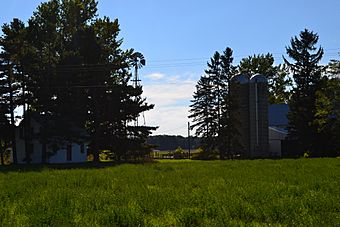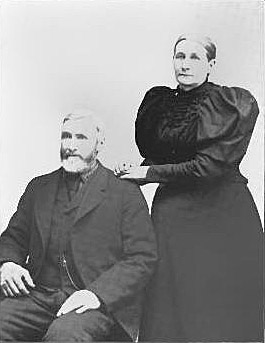William and Margaret McFarland Core Farm
Quick facts for kids |
|
|
William and Margaret McFarland Core Farm
|
|
 |
|
| Location | 5946 S. Center Hwy & 5856 S. Lake Leelanau Dr. Bingham Township, Leelanau County, Michigan |
|---|---|
| Area | 148.6 acres (60.1 ha) |
| Built | 1865 |
| Architectural style | Greek Revival, Gabled-Ell House |
| NRHP reference No. | 04001579 |
| Added to NRHP | February 2, 2005 |
The Ruby Ellen Farm, originally known as the William and Margaret McFarland Core Farm, is a historic farm located in Bingham Township, Leelanau County, Michigan. You can find it at 5946 South Center Highway and 5856 South Lake Leelanau Drive. This special farm was owned and worked by the Core family for almost 150 years, from 1865 until 2011. Because of its long history, it was added to the National Register of Historic Places in 2005. Today, it is still a working farm and is sometimes open for visitors.
Contents
A Farm's Long History
The story of this farm begins with William Core. He was born in Lincolnshire, England in 1842. When he was four, his family moved to Canada. As a young man, William left home to work on farms.
In 1861, he came to Leelanau County. Two years later, he joined the First Michigan Light Artillery. He fought in the Civil War for about a year and a half.
Starting the Farm
After the war, in 1865, William Core returned to Leelanau County. He bought 160 acres of land to start his own farm. This is called "homesteading," where you settle and build on land. He immediately began farming and building structures.
In 1867, William married Margaret McFarland. They had ten children together. Eight of their children grew up on the farm: Perry, Arzina, Annie, Lucy, Julius, George, David, and Oscar.
Passing Down the Farm
The farm stayed in the Core family for many years. In 1927, William Core's granddaughter, Ruby Ellen Core Dobson, and her husband Harvey bought the farm. They kept it running, even through tough times. During the Great Depression, they lost the farm for a short time. But they worked hard and managed to buy it back from the bank!
When Harvey passed away in 1969, the farm went to their son, Rex Dobson. Rex never married, and he was the last of his family line.
Protecting the Farm's Future
By 1999, Rex Dobson was worried about new buildings spreading from nearby Traverse City. He wanted to protect the farm's open land. So, he sold the "development rights" for 90 acres. This means that part of the farm can never be built on. It was a way to keep the land as farmland forever.
In 2002, Rex created a special group called The Rex Dobson Ruby Ellen Farm Foundation. This group helps take care of the farm's buildings. In 2005, he had the farm listed on the National Register of Historic Places. This helps protect its history. The farm was even used to film a movie called "Red Barn" in 2004!
Rex Dobson passed away in 2011. This marked the end of 146 years of the Core family running the farm. Today, the Ruby Ellen Farm is still a working farm. People can visit by making arrangements beforehand.
What the Farm Looks Like
The William and Margaret McFarland Core Farm is located among gentle, rolling hills. It has fields, forests, and fruit orchards. The farm has 14 buildings spread across about 150 acres of land.




